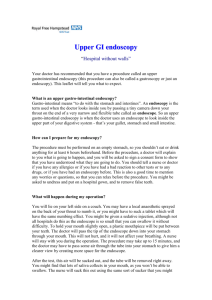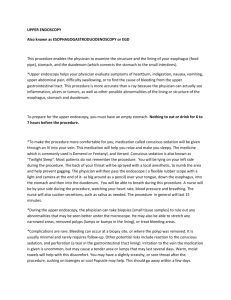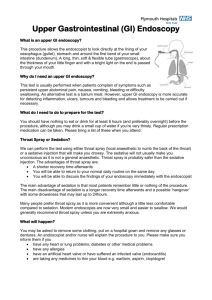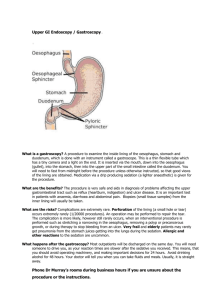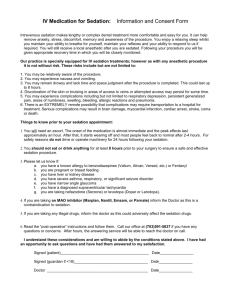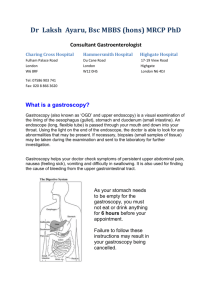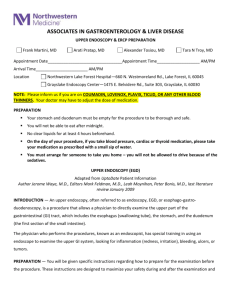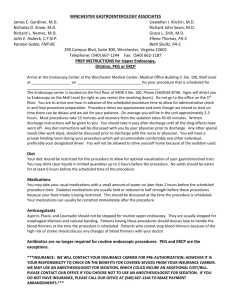Royal National Hospital for Rheumatic Diseases
advertisement
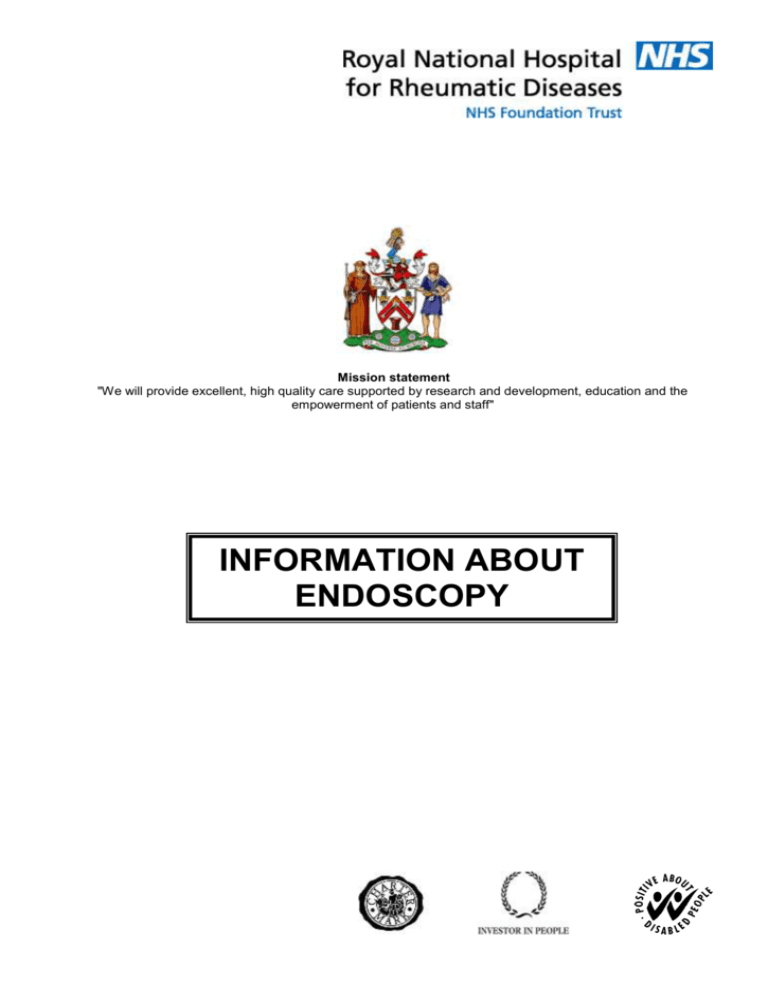
Mission statement "We will provide excellent, high quality care supported by research and development, education and the empowerment of patients and staff" INFORMATION ABOUT ENDOSCOPY Things you may wish to know about having an Endoscopy (Gastroscopy) After considering alternative ways of investigating your symptoms your doctor has advised that you should have an upper gastro-intestinal endoscopy, this is a routine test commonly carried out to help to clarify the cause of your symptoms. The following is some information and instructions you need to know before having this procedure. What do you have to do? When we receive a request from your doctor to carry out this examination, our appointments office will contact you by telephone or letter to arrange an appointment. You will be sent written information about the procedure, which you must read. We ask you to arrive on time, and to contact the Receptionist, situated on the ground floor, where you will be directed to the Endoscopy Department. You must arrange for someone to take you home. If you have had sedation you will not be able to drive yourself. It is recommended that you do not drive for the next 24 hours, or do anything that requires fine judgement involving machinery, in case you injure yourself. What is an Endoscopy (Gastroscopy)? Gastroscopy is a technique by which the doctor can look directly into your oesophagus (gullet), stomach and duodenum, to investigate your problem. It also allows samples of tissue to be taken, painlessly, for testing. The endoscope is a thin flexible tube with a bright light and tiny video camera on the end. This is passed through your mouth and down into your stomach. The camera plays the images on a screen, which allows the endoscopist, (the person who is doing your test) to view the interior of your gullet or stomach. As with any medical procedure, there is an element of risk involved in endoscopy. However, all our staff are highly trained and are able to deal with any situation which may arise. According to the British Society of Gastroenterology Guidelines, endoscopic procedures carry a 1 in 3000 risk of bleeding (haemorrhage) or perforation of the gut, following which surgery may be necessary. Other rare complications include aspiration pneumonia and a reaction to the IV sedative drugs or local anaesthetic throat spray if it is used. Upper gastro-intestinal endoscopy may involve a slight risk to crowned teeth or dental bridgework. Each of these risks occurs in less than 1% of procedures. 1 What should I expect? The Preparation To allow a clear view, the stomach must be empty. Therefore you must not have anything to eat or drink for several hours before the examination. Once your appointment had been made you will receive further information and guidance on this. As space on the Unit is limited, please bring only 1 person (an adult) to accompany you. This person will need to leave after the initial admission and will be advised when to return. When you come to the Department, a nurse will explain the procedure to you in detail. The endoscopist will also see you, and they will also want to know about any previous endoscopies you have had. If you have any worries or questions at this stage, don’t be afraid to ask. The staff will want you to be as relaxed as possible for the test, and will not mind answering your queries. The doctor will ask you to read and sign a consent form and make sure that you understand the investigation and its implications. If you need reading glasses please bring them with you. Please tell the endoscopist or nurse if you have had any allergies or adverse reactions to drugs or other tests. During the test In the examination room you will be made comfortable on a couch, resting on your left side. You will not have to undress, but must remove dentures and glasses. A nurse will stay with you throughout the test. You may have an injection in your arm to make you sleepy and relaxed. Some patients now find that the test can be performed without sedation, but with a local anaesthetic throat spray applied to the back of the throat. To keep your mouth slightly open, a plastic mouthpiece will be put between your teeth. When the doctor passes the endoscope into your stomach, it will cause you little distress, and will not interfere with your breathing at any time. Modern endoscopes are quite thin and easy to pass. The examination will take approximately 5-10 minutes. During this time some air will be passed down the tube to distend the stomach and allow the doctor a clear view. The air is sucked out at the end of the test. 2 If you collect saliva in your mouth, the nurse will clear it using a small suction tube. When the examination is finished the endoscope is removed quickly and easily. About Sedation A canula will be placed into the back of your hand or arm and the sedative will be injected through it. Sedation will make you relaxed and makes you drowsy. You may not remember the procedure taking place. However, this is not a general anaesthetic. You may wake up fairly quickly – or more slowly: each person reacts differently. You will have your blood pressure and pulse monitored. You will probably remain in the Unit for about 40 minutes but the effects of the sedation will not wear off totally for 24 hours. Your thinking processes and movements will be slower than usual; hence you must not drive or operate machinery for 24 hours. About Throat Spray Throat spray is a local anaesthetic that is sprayed onto the back of your throat to numb it. This will enable the endoscope to pass more easily. It means that you can stay awake during the procedure and you can leave the Unit as soon as the examination is over. However, you should have nothing to eat or drink until after the effect of the spray has worn off, because your swallowing will be impaired. After the Test If you have had sedation, you will be left to rest in the unit for about 40 minutes. Your blood pressure and pulse recordings will be taken. You will be given a drink and biscuits when you are fully awake. You may also feel a little bloated if some air has remained in your stomach. This discomfort will pass, and needs no medication. Going Home If you have had a throat spray you can make your own way home or go back to work. If you have had sedation (an injection) and are going home after the test, a responsible adult should come to the Unit to pick you up. 3 When you get home it is important to rest quietly for the remainder of the day, with someone to look after you for 24 hours if possible. The effects of the sedative lasts longer than you think. It is also advisable that you do not take sole responsibility for children or anyone who is in need of your care e.g. the elderly for 24 hours after having sedation. For the first 24 hours after having sedation you should not: Drive a car Operate any machinery – not even a kettle. Sign any legally binding documents The effects of the test and injection should have worn off after 24 hours when most patients are able to resume normal activities. Please note that some insurance companies will not insure you if you do not follow these instructions. When will you know the results? The doctor will be able to tell you the results straight after the test, or if you have been sedated, as soon as you wake up. However, if samples (biopsies) have been taken for examination, the results may take up to two weeks and will be sent to your General Practitioner (GP). You will be given a report of your examination to take to your GP surgery. You should discuss the details of the results and necessary treatment with your GP or hospital specialist – whoever it was who referred you to have the test. If you need further information about your procedure, between 9-5 Monday to Friday please telephone 01225-473409, where a member of the unit staff will be pleased to help you. Out of these hours, you may get general advice for serious problems relating to your procedure by telephoning the on call doctor on 01225 465941. Cancellation of appointment If you need to cancel the appointment please: Always inform the Appointments Office as soon as possible so that alternative arrangements can be made for you (tel: 01225-473401). 4 Never fail to let the Hospital know that you cannot attend, the more notice you can give us the more chance we have to give another patient your appointment time. Transport If transport has been arranged for you by your GP, and for any reason you do not require it, please ensure that it is cancelled. Bath Spa railway station and the coach station is within half a mile of the hospital. Taxis are available. We regret that the hospital does not have a car park for the use of patients and their escorts. There are a number of public car parks available and that are close to the hospital, and a map will be sent to you to show you where these are located. Cars may drop patients off outside the front entrance of the hospital, but may park only if they display a “disabled” sticker. Access to the hospital Automatic doors allow easy access to the hospital, and a lift is available to take you to the ground floor, where Reception is situated, if you cannot manage the steps. Please ask the Switchboard/Enquiry Desk if you need assistance to operate the lift. Comments, suggestions and complaints We are continually striving to improve our care and achieve maximum customer satisfaction. We welcome constructive criticism and comments to help us attain our aim. To this end we would like you to take part in our Patient Satisfaction Survey. This will involve filling in a simple questionnaire. It is anonymous. If you are worried or concerned about anything it is best to try to resolve it with the person involved and/or a senior member of staff. Very often they will be able to reassure you, sort out the problem, or bring in someone who may be able to do so. If you wish to make a formal complaint, you may write to the Chief Executive, or, if you prefer, someone will make a note of your complaint and pass it on to the Chief Executive. The Nurse in Charge will arrange this for you. Your complaint will be investigated and a reply sent to you. If you are then dissatisfied with the way your complaint is dealt with, you may write to the Community Health Council or the Health Services Commissioner (The Ombudsman). 5 Clinical Training It would be impossible to train future members of the health professions without the help and co-operation of patients. This is a hospital where such staff are trained. Training takes place in the Endoscopy Unit as well as in the wards and Out Patient Department. This means that a student may be present at the time of your examination. We hope you will co-operate in this work if we need your help. If, however, you do not wish students to be present, you are absolutely free to refuse without your treatment being affected in any way. Please inform the nurse at the earlier opportunity if you do not wish students to be present during your examination. The Trust believes that all patients who attend the Royal National Hospital for Rheumatic Diseases as day patients have the right to expect certain levels of care which include the right to: Receive competent health care according to their individual needs without undue delay. Expect privacy, dignity and respect at all times. Expect all information to be dealt with confidentially. Not be subjected to any treatment without their consent. Choose to be informed about all aspects of their illness if they wish 6

